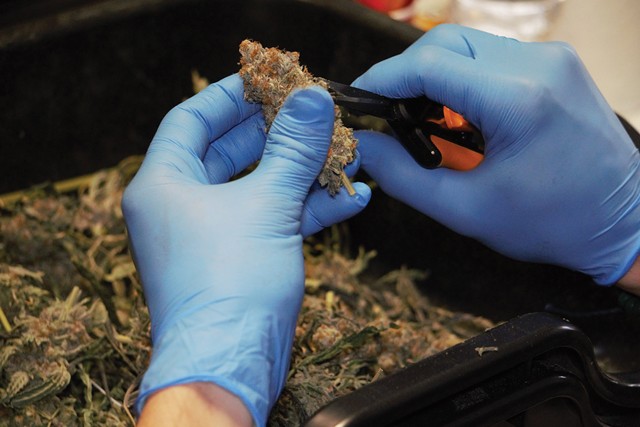[
{
"name": "500x250 Ad",
"insertPoint": "5",
"component": "15667920",
"parentWrapperClass": "",
"requiredCountToDisplay": "1"
}
]
When state lawmakers crafted the legislation that would make cannabis legal, they had two main goals.
The first was to ensure the state got a cut of what experts anticipated being a $6 billion industry. The second was undoing decades of harm from the criminalization of marijuana by giving people of color and “legacy” cannabis dealers priority to join the legal industry.
People like Grant “Skribe da God” Atkins.
He hustled pot on the street as a teenager, was an original member of the reggae band Giant Panda Guerilla Dub Squad, and became a leader in the cannabis industry collaborative group NY Green Coalition and eventually a driving mind behind local cannabis brands Lambsbreath and 6Point Cannabis. He also teaches social studies in Rochester public schools.
On paper, Atkins is poised to cash in on legal cannabis. But with delays hampering the legal retail market, Atkins worries that he’s already being muscled out by a burgeoning black market. He says his survival as a player has never been more threatened.
“This is the hardest time I’ve ever experienced in the cannabis industry, and I’ve been involved with it since 1997,” Atkins said. “And what’s making it harder is the profuse over-supply of black-market cannabis.”
Stop in just about any corner store in Rochester and there will likely be some sort of cannabis product — flower, extract vaporizers, edibles, or tinctures — for sale illegally. Most of these products come from states where retail cannabis is legal but, for one reason or another, were rejected there. California is a huge source of these products, earning them the moniker of “Cali-pack.” They are shipped here illegally by the same criminal operations that moved pot into Rochester well before legalization.
There are virtually no legal consequences for the retailers who sell these items. Law enforcement is loath to make marijuana arrests these days. But an ancillary consequence is that people like Atkins, who are looking to play by the rules, are finding themselves being elbowed aside.
“It was tough before legalization,” Atkins said. “It’s next to impossible now.”
Welcome to the Green Rush
In March 2021, former Gov. Andrew Cuomo signed the Marihuana Regulation and Taxation Act into law, legalizing the possession of cannabis and setting into motion the creation of a regulated marketplace.
It was considered among the most progressive cannabis legalization laws in the nation, putting a high-emphasis on so-called “equity licenses.” That provision was to ensure that people of color, people convicted of crimes involving possessing and selling marijuana in the past, and people from communities disproportionately hit by criminalization would be at the front of the line to enter the legal market. The idea was to foster a sustainable industry led not by massive corporations, but small-time craft growers, processors, and sellers from New York.
But the licensing process has been slow. As of mid-March, only five legal dispensaries have opened in New York. Three are in New York City, one is in Binghamton, and one is in Ithaca.
Part of the delay has been a lawsuit filed by a Michigan-based cannabis company, Variscite, that argues that giving priority to New Yorkers is unconstitutional. The company filed a similar lawsuit against the city of Los Angeles.
It is against this backdrop that the black market cannabis industry in New York has flourished, while those people the law was meant to benefit have yet to reap their rewards.
“It’s the green rush,” said Keith Messenger, of Chrome Grown, a manufacturer of pre-rolled joints, balms, and edibles with plants in Rochester and Binghamton. “Just like in the gold rush, it wasn’t the miners making the money, it was the people selling the shovels….So we’ve got these people looking to make money in the industry that don’t know the industry.”
Messenger lit a joint and took a long drag. He and his business partner, Enoch Henry, are legacy market stalwarts. He, too, said that times have never been harder for them to move their products.
“They get on Telegram, they start importing stuff, we’ve got people going around bringing in truckloads of stuff from out of state,” Messenger said of the burgeoning black market. “It’s swamping us out. The legacy people like me . . . are struggling.”
Pot Purgatory
The situation is no surprise to Damian Fagon, the Office of Cannabis Management’s chief equity officer, and, he said, it is not likely to go away anytime soon.
“We’re three months into our fully-formed supply chain,” Fagon said. “This is going to take years, and I really encourage the legacy guys who are hoping to take advantage of this opportunity to not despair at this initial volatility. It happens in every market, and it’s going to continue until we reach a more stable, sustainable, complete supply chain.”
Fagon described the current cannabis market as “labyrinthian,” ripe with complicated nuances. He said, though, that the state wants to support the legacy businesses trying to push into the legal market.
“I think a lot of the legacy guys recognize that we want them in the legal market,” Fagon said. “We want the legal market to work for small growers, craft growers, and communities across the state.”
Fagon said the state does not anticipate eliminating a cannabis black market, but is instead focused on making the legal market preferable to consumers.
For Atkins, cannabis is more than just a business prospect. It’s a passion, and an industry he sees as having the potential to bind together Rochester’s ecosystem of art, music, and culture.
“I’ve been doing this since I was 13, and I’m 44 now,” Atkins said. “I’ll never tap out, because that would be like not being who I am. It’s almost like I can’t not be Black, so I always have to be engaged on the frontlines of Black liberation. I can’t not be cannabis in the same way.”
Gino Fanelli is a CITY staff writer. He can be reached at (585) 775-9692 or [email protected].
The first was to ensure the state got a cut of what experts anticipated being a $6 billion industry. The second was undoing decades of harm from the criminalization of marijuana by giving people of color and “legacy” cannabis dealers priority to join the legal industry.
People like Grant “Skribe da God” Atkins.
He hustled pot on the street as a teenager, was an original member of the reggae band Giant Panda Guerilla Dub Squad, and became a leader in the cannabis industry collaborative group NY Green Coalition and eventually a driving mind behind local cannabis brands Lambsbreath and 6Point Cannabis. He also teaches social studies in Rochester public schools.
On paper, Atkins is poised to cash in on legal cannabis. But with delays hampering the legal retail market, Atkins worries that he’s already being muscled out by a burgeoning black market. He says his survival as a player has never been more threatened.
“This is the hardest time I’ve ever experienced in the cannabis industry, and I’ve been involved with it since 1997,” Atkins said. “And what’s making it harder is the profuse over-supply of black-market cannabis.”
Stop in just about any corner store in Rochester and there will likely be some sort of cannabis product — flower, extract vaporizers, edibles, or tinctures — for sale illegally. Most of these products come from states where retail cannabis is legal but, for one reason or another, were rejected there. California is a huge source of these products, earning them the moniker of “Cali-pack.” They are shipped here illegally by the same criminal operations that moved pot into Rochester well before legalization.
There are virtually no legal consequences for the retailers who sell these items. Law enforcement is loath to make marijuana arrests these days. But an ancillary consequence is that people like Atkins, who are looking to play by the rules, are finding themselves being elbowed aside.
“It was tough before legalization,” Atkins said. “It’s next to impossible now.”
Welcome to the Green Rush
In March 2021, former Gov. Andrew Cuomo signed the Marihuana Regulation and Taxation Act into law, legalizing the possession of cannabis and setting into motion the creation of a regulated marketplace.
It was considered among the most progressive cannabis legalization laws in the nation, putting a high-emphasis on so-called “equity licenses.” That provision was to ensure that people of color, people convicted of crimes involving possessing and selling marijuana in the past, and people from communities disproportionately hit by criminalization would be at the front of the line to enter the legal market. The idea was to foster a sustainable industry led not by massive corporations, but small-time craft growers, processors, and sellers from New York.
But the licensing process has been slow. As of mid-March, only five legal dispensaries have opened in New York. Three are in New York City, one is in Binghamton, and one is in Ithaca.
Part of the delay has been a lawsuit filed by a Michigan-based cannabis company, Variscite, that argues that giving priority to New Yorkers is unconstitutional. The company filed a similar lawsuit against the city of Los Angeles.
It is against this backdrop that the black market cannabis industry in New York has flourished, while those people the law was meant to benefit have yet to reap their rewards.
“It’s the green rush,” said Keith Messenger, of Chrome Grown, a manufacturer of pre-rolled joints, balms, and edibles with plants in Rochester and Binghamton. “Just like in the gold rush, it wasn’t the miners making the money, it was the people selling the shovels….So we’ve got these people looking to make money in the industry that don’t know the industry.”
Messenger lit a joint and took a long drag. He and his business partner, Enoch Henry, are legacy market stalwarts. He, too, said that times have never been harder for them to move their products.
“They get on Telegram, they start importing stuff, we’ve got people going around bringing in truckloads of stuff from out of state,” Messenger said of the burgeoning black market. “It’s swamping us out. The legacy people like me . . . are struggling.”
Pot Purgatory
The situation is no surprise to Damian Fagon, the Office of Cannabis Management’s chief equity officer, and, he said, it is not likely to go away anytime soon.
“We’re three months into our fully-formed supply chain,” Fagon said. “This is going to take years, and I really encourage the legacy guys who are hoping to take advantage of this opportunity to not despair at this initial volatility. It happens in every market, and it’s going to continue until we reach a more stable, sustainable, complete supply chain.”
Fagon described the current cannabis market as “labyrinthian,” ripe with complicated nuances. He said, though, that the state wants to support the legacy businesses trying to push into the legal market.
“I think a lot of the legacy guys recognize that we want them in the legal market,” Fagon said. “We want the legal market to work for small growers, craft growers, and communities across the state.”
Fagon said the state does not anticipate eliminating a cannabis black market, but is instead focused on making the legal market preferable to consumers.
For Atkins, cannabis is more than just a business prospect. It’s a passion, and an industry he sees as having the potential to bind together Rochester’s ecosystem of art, music, and culture.
“I’ve been doing this since I was 13, and I’m 44 now,” Atkins said. “I’ll never tap out, because that would be like not being who I am. It’s almost like I can’t not be Black, so I always have to be engaged on the frontlines of Black liberation. I can’t not be cannabis in the same way.”
Gino Fanelli is a CITY staff writer. He can be reached at (585) 775-9692 or [email protected].
Latest in News
More by Gino Fanelli
-

These small cannabis farmers say New York's legal weed rollout is ruining their lives
Mar 21, 2024 -

Man shakes fist at sun
Mar 15, 2024 -

Finger Lakes in a can, by way of Hollywood
Feb 13, 2024 - More »







